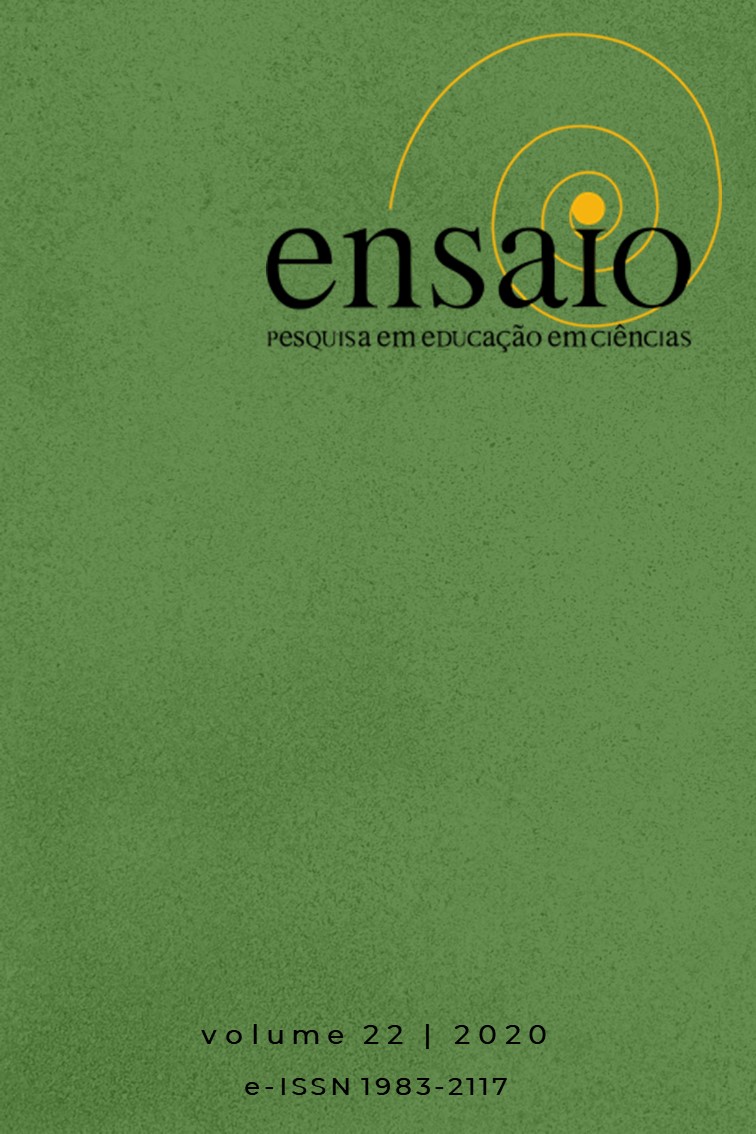A CONCEITUALIZAÇÃO DE MODELOS EM FÍSICA: APROXIMAÇÕES E DISTANCIAMENTOS ENTRE AS VISÕES DE MARIO BUNGE E GÉRARD VERGNAUD
MODEL CONCEPTUALISATION IN PHYSICS: APPROXIMATIONS AND DIFFERENCES BETWEEN BUNGE’S AND VERGNAUD’S UNDERSTANDINGS
DOI:
https://doi.org/10.1590/21172020210109Palavras-chave:
Modelização; Epistemologia; Teoria dos Campos Conceituais.Resumo
Esse estudo visa contribuir para o entendimento do processo de conceitualização de modelos no ensino-aprendizagem de Física articulando dois referenciais teóricos de análise: um referencial epistemológico - a teoria sobre modelos de M. Bunge - e um referencial cognitivo - A Teoria dos Campos Conceituais de G. Vergnaud. Ao discutir aproximações e distanciamentos entre as visões desses autores, apontamos a compatibilidade entre as suas compreensões sobre a natureza do conhecimento e sobre a relação entre o conhecimento e seu referente, que constitui um aspecto-chave da modelização. Concluímos que esses dois referenciais teóricos podem ser articulados e defendemos que essa articulação pode contribuir para avançar no entendimento de como os estudantes conceitualizam o processo de modelização e os próprios conceitos científicos na aprendizagem científico-escolar.
This study aims to contribute to understanding the process of conceptualisation of models in physics teaching by articulating two theoretical frameworks: an epistemological framework - M. Bunge’s theory about models - and a cognitive referential - G. Vergnaud’s Theory of Conceptual Fields. When discussing approximations and differences between the views of these authors, we point out the compatibility between their understandings about the nature of knowledge and the relation between knowledge and its referent, which is a key aspect of modeling. We conclude that these two theoretical references can be articulated, and we argue that this articulation can contribute to advance in the understanding of how students conceptualize the modelling process.
Referências
ANGELL, C.; KIND, P. M.; HENRIKSEN, E. K; GUTTERSRUD, O. An empirical-mathematical modeling approach to upper secondary physics. Physics Education, v. 43, n. 3, 2008. [ Links ]
BUNGE, M. Concepts of model. In: Method, model and matter. Springer Netherlands, p. 91-113, 1973a. [ Links ]
BUNGE, M. Philosophy of physics. Dordrecht: Reidel, 1973b. [ Links ]
BUNGE, M. Teoria e realidade. São Paulo: Perspectiva, 1974. [ Links ]
BUNGE, M. Treatise on basic philosophy: Ontology I: the furniture of the world. Dordrecht: Reidel, 1977. [ Links ]
BUNGE, M. La ciencia, su método y su filosofía. Buenos Aires: Siglo Veinte, 1979. [ Links ]
BUNGE, M. Epistemology & Methodology I: Exploring the World. Dordrecht: Reidel, 1983. [ Links ]
BUNGE, M. Philosophy of science: from problem to theory. Transaction Publishers, 1998. [ Links ]
CARTWRIGHT, N. How the laws of physics lie. Oxford: Clarendon Press, 1983. [ Links ]
CLEMENT, J. Learning via model construction and criticism. In: GLOVER, J.; RONNING, R.; REYNOLDS, C. (ed.). Handbook of creativity. Boston: Springer US, 1989. p. 341-381. [ Links ]
GILBERT, J.K.; PIETROCOLA, M.; ZYLBERSZTAJN, A.; FRANCO, C. Science and education: Notions of reality, theory and model. In: GILBERT, J. K.; BOULTER, C. Developing models in science education. Dordrecht: Springer, 2000. p. 19-40. [ Links ]
GILBERT, J. K.; JUSTI, R. Modelling-based Teaching in Science Education. Springer International Publishing, 2016. [ Links ]
GROSSLIGHT, L.; UNGER, C.; JAY, E; SMITH, C. L. Understanding models and their use in science: Conceptions of middle and high school students and experts. Journal of Research in Science Teaching, v. 28, 1991. [ Links ]
HALLOUN, I. Ab.; HESTENES, D. Modeling instruction in mechanics. American Journal of Physics, v. 55, n. 5, p. 455-462, 1987. [ Links ]
HARRISON, A. G.; TREAGUST, D. F. Learning about atoms, molecules, and chemical bonds: A case study of multiple-model use in grade 11 chemistry. Science Education, v. 84, n. 3, p. 352-381, 2000 [ Links ]
KOPONEN, I. T. Models and modelling in physics education: A critical re-analysis of philosophical underpinnings and suggestions for revisions. Science & Education, v. 16, n. 7, p. 751-773, 2007. [ Links ]
MORGAN, M. S.; MORRISON, M. Models as mediators: Perspectives on natural and social science. Cambridge: Cambridge University Press, 1999. [ Links ]
PIETROCOLA, M. A matemática como estruturante do conhecimento físico. Caderno Brasileiro de Ensino de Física, Florianópolis, v. 19, n. 1, p. 93-114, 2002. [ Links ]
VERGNAUD, G. Psychologie du développement cognitif et didactique des mathématiques. Grand N, v. 38, p. 21-40, 1986. [ Links ]
VERGNAUD, G. La formation des concepts scientifiques. Relire Vygotski et débattre avec lui aujourd’hui. Enfance, v. 42, n. 1, p. 111-118, 1989. [ Links ]
VERGNAUD, G. La théorie des champs conceptuels. Recherches en Didactique des Mathématiques, v. 10, n. 23, p. 133-170, 1990. [ Links ]
VERGNAUD, G. Teoria dos campos conceituais. In: Seminário Internacional de Educação Matemática, 1., 1993, Rio de Janeiro. Anais do1ºSeminário Internacional de Educação Matemática, p. 1 - 26, 1993. [ Links ]
VERGNAUD, G. Homomorphismes réel-représentation et signifié-signifiant: Exemples en mathématiques. Didaskalia, n. 5, p. 25-34, 1994. [ Links ]
VERGNAUD, G. Towards a cognitive theory of practice. In: Mathematics education as a research domain: A search for identity. Springer Netherlands, p. 227-240, 1998. [ Links ]
VERGNAUD, G. L’explication est-elle autre chose que la conceptualisation? Raisons éducatives, p. 31-44, 2002. [ Links ]
VERGNAUD, G. ¿ En qué sentido la teoría de los campos conceptuales puede ayudarnos para facilitar aprendizaje significativo? Investigações em Ensino de Ciências, v. 12, n. 2, p. 285-302, 2007a. [ Links ]
VERGNAUD, G. Représentation et activité: deux concepts étroitement associés. Recherches en Education, v. 4, p. 9-22, 2007b. [ Links ]
VERGNAUD, G. The theory of conceptual fields. Human development, v. 52, n. 2, p. 83-94, 2009. [ Links ]
VERGNAUD, G. Au fond de l’action, la conceptualisation. In: Savoirs théoriques et savoirs d’action. Presses Universitaires de France, p. 275-292, 2011. [ Links ]
VERGNAUD, G. Pourquoi la théorie des champs conceptuels?Infancia y Aprendizaje, v. 36, n. 2, p. 131-161, 2013. [ Links ]
WEIL-BARAIS, A.; VERGNAUD, G. Students conception in Physics and Mathematics: biases and helps. In: CAVERNI, J. P.; FABRE, J. M.; GONZÁLEZ, M. (ed.). Cognitive biases. North Holland: Elsevier Science Publishers, 1990. [ Links ]


